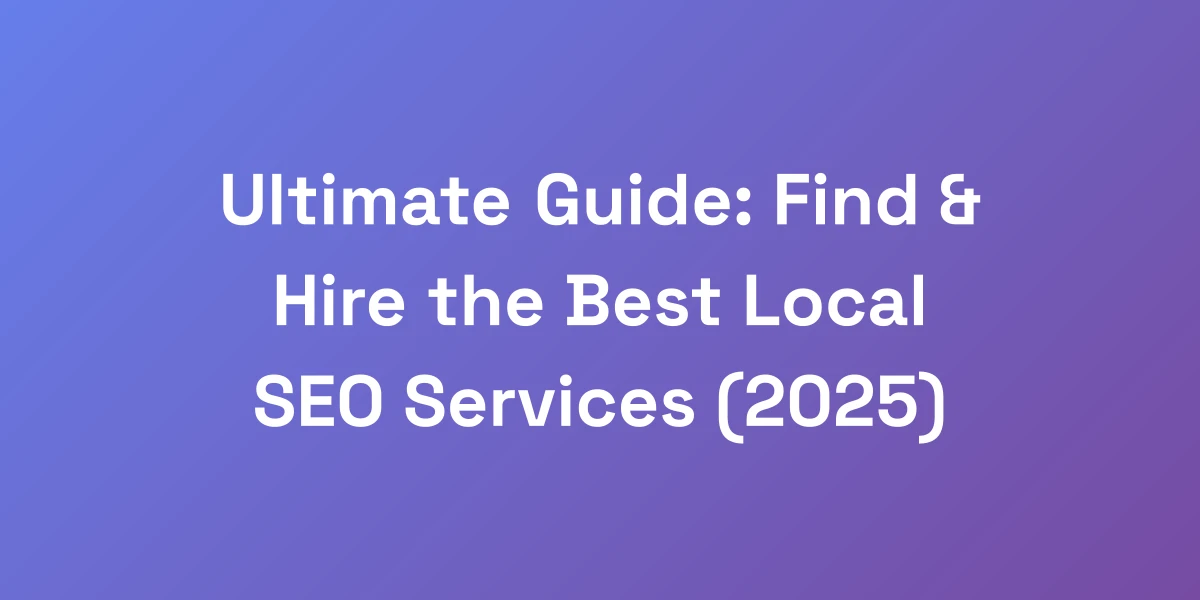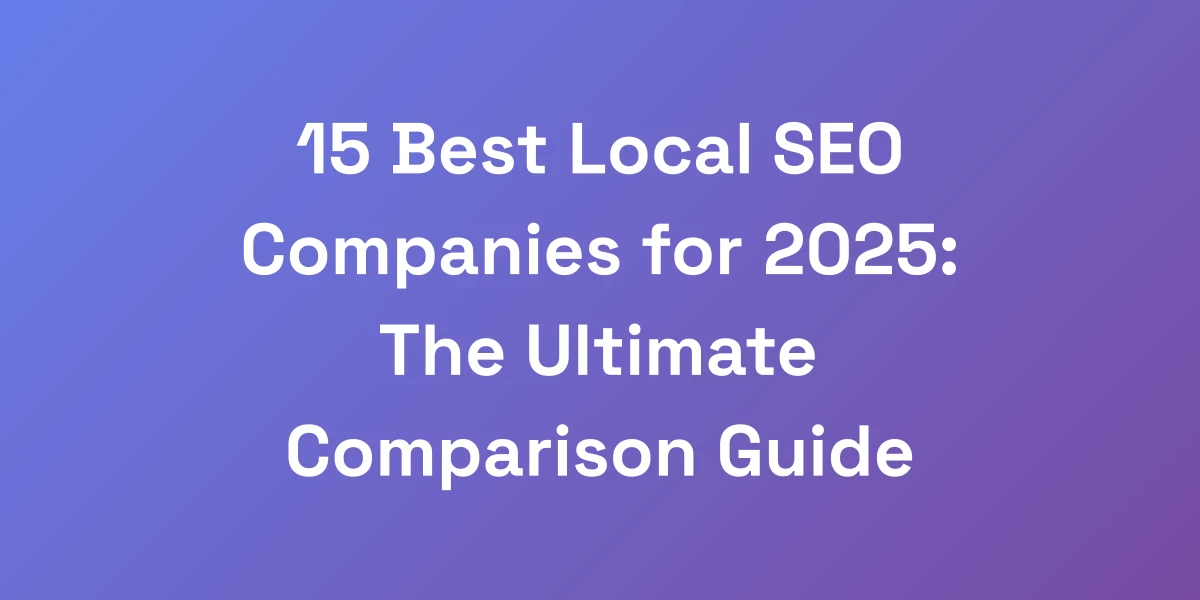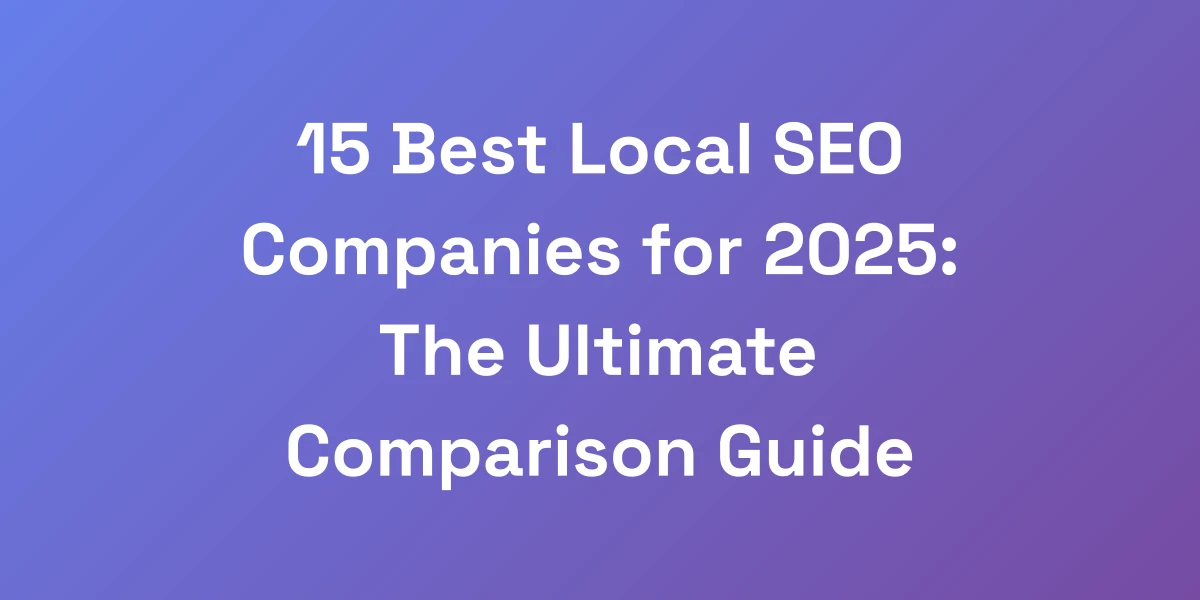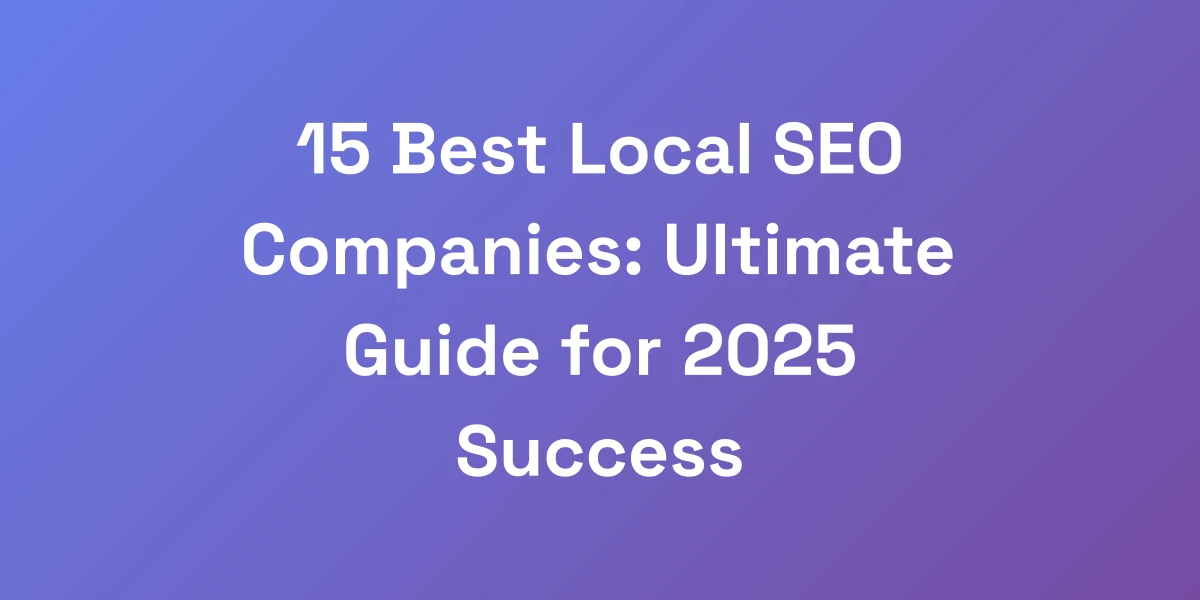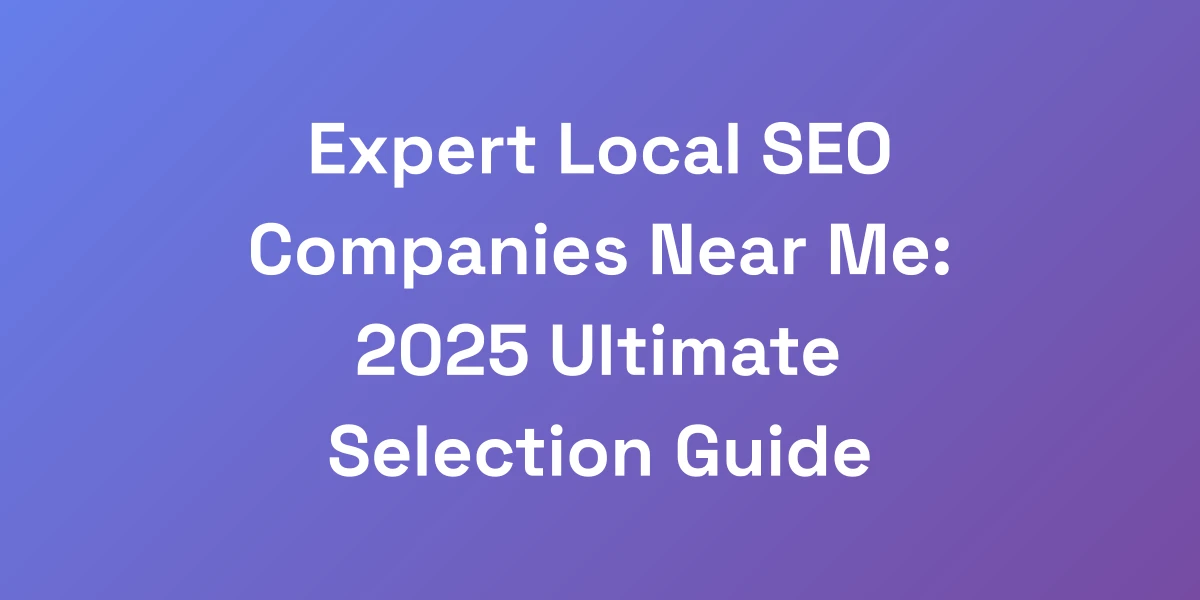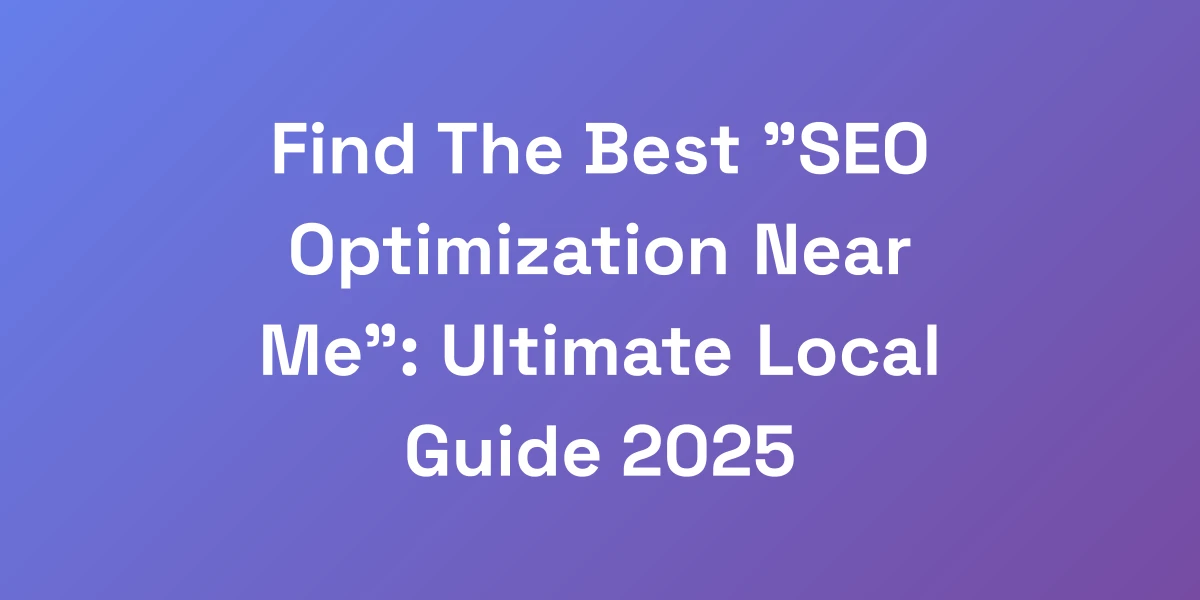
Find The Best “SEO Optimization Near Me”: Ultimate Local Guide 2025
Feb 27, 2025 | By [email protected]
Picture this: you’re a local business owner with a killer product, but when someone searches “SEO optimization near me“, your business is nowhere to be found. Frustrating, right?
In the fast-paced digital age, mastering local SEO isn’t just a nice-to-have—it’s a necessity. We’re diving deep into why local SEO services are your golden ticket to skyrocketing your neighborhood presence in 2025.
From understanding the seismic shifts in local search behavior to avoiding the pitfalls of shady SEO providers, we’ve got you covered. Ready to dominate your local market? Let’s get into it.
Why Local SEO Services Matter More Than Ever in 2025
Let us hit you with some truth bombs: local SEO isn’t just another marketing buzzword—it’s your ticket to dominating your neighborhood’s digital real estate.
We’ve seen countless businesses blow up (in a good way) just by nailing their local search game. Here’s the kicker: 93% of consumers now use online searches to find local businesses. If you’re not showing up when they type “SEO optimization near me“, you’re basically handing your competitors a blank check.
The game has changed, folks, and local SEO expertise isn’t just nice to have—it’s do or die.
The Post-Pandemic Shift to Local Search Behavior
The pandemic reshaped how consumers interact with local businesses. With more people prioritizing nearby options, the rise in local search behavior is undeniable.
Statistics show that 80% of U.S. consumers search online for local businesses weekly, and a whopping 32% search daily. This shift emphasizes the need for businesses to be highly visible in local searches to capture this growing audience.
For example, a local coffee shop optimized for local SEO might see a surge in foot traffic, especially as people continue to seek out familiar, trusted establishments in their vicinity.
Impact of Google’s Local Search Algorithm Updates
Google doesn’t sit still, and neither should your SEO strategy. Recent algorithm updates have placed even greater emphasis on local relevance and user intent.
For instance, the November 2023 core update increased the importance of opening hours as a ranking factor. Businesses that keep their hours updated and accurate are more likely to rank higher in local searches.
Moreover, Google search changes means managing your reputation across various review sites is more critical than ever for maintaining strong local rankings.
Mobile-First Indexing and Local SEO Connection
With mobile-first indexing now a reality, your website’s mobile performance directly impacts your local SEO rankings. In fact, 70% of websites have adopted mobile-friendly designs to stay competitive in local searches.
Consider a local bakery that optimizes its website for mobile: faster load times, responsive design, and easy navigation can lead to higher search rankings and increased customer engagement.
Voice Search Revolution in Local Business Discovery
Voice search is transforming how consumers find local businesses. By 2024, over 50% of all searches are expected to be conducted through voice commands.
Imagine a user asking, “Where’s the best SEO optimization near me?” Your business needs to be optimized for these conversational queries to capture this growing segment of searchers.
Optimizing for voice search involves using natural language, long-tail keywords, and structured data to ensure your business appears in voice search results.
Why DIY SEO Often Falls Short
While DIY SEO might seem like a cost-effective solution, it often falls short of delivering the desired results. Local SEO is complex, requiring constant updates and a deep understanding of search algorithms. AI-powered auto SEO software can simplify these tasks, ensuring that your strategy is comprehensive, up-to-date, and tailored to your specific market needs.
Businesses attempting to handle SEO in-house without the right expertise may find themselves missing out on crucial opportunities or even harming their online presence with misguided strategies.
Instead, partnering with a professional local SEO provider ensures that your strategy is comprehensive, up-to-date, and tailored to your specific market needs.
Red Flags to Avoid When Choosing a Local SEO Provider
Listen up, because this might save you thousands: not all SEO providers are created equal, and some are straight-up digital snake oil salesmen.
We’ve interviewed hundreds of business owners, and the horror stories would make your skin crawl. The biggest red flag? Anyone promising #1 rankings in 30 days is feeding you BS.
Real SEO is like building muscle—it takes time, consistency, and the right approach. Let us walk you through the warning signs that should send you running faster than a caffeinated cheetah.
Guaranteed Rankings and Other Empty Promises
Beware of providers that guarantee top rankings. SEO is influenced by numerous factors, many of which are outside anyone’s control, such as competitor actions and algorithm changes.
Instead of promises, look for providers who focus on transparent strategies and realistic goals. They should clearly explain what they can achieve and how, without overhyping results.
Black Hat Techniques That Could Tank Your Site
Some SEO providers resort to black hat techniques like keyword stuffing, cloaking, or buying backlinks. These methods might offer short-term gains but can lead to severe penalties from Google.
Ensure your provider adheres to white-hat SEO practices. Ask about their strategies and avoid those who suggest unethical methods to boost your rankings.
The Truth About SEO Pricing (What’s Too Good to Be True)
If a local SEO service is priced significantly lower than the industry average, it’s a red flag. Quality SEO requires expertise, time, and resources, which are reflected in the affordable SEO for small businesses.
Compare pricing across reputable providers and be wary of those promising high-quality services at rock-bottom prices. Remember, you often get what you pay for.
Common Outsourcing Traps to Watch For
Outsourcing SEO to foreign agencies might seem tempting due to lower costs, but it comes with risks. These providers may not understand your local market or may use unethical practices.
Opt for local SEO providers who have a proven track record in your specific market. They’ll have the necessary insights and strategies tailored to your local audience.
Why Transparency Matters in SEO Reporting
Transparency is key in any partnership, especially with SEO providers. They should offer clear, regular reports detailing the work being done and the progress being made.
If a provider is vague about their methods or reluctant to share reports, it’s a sign they might be hiding something. Choose providers who are open and communicative about their processes and results.
Essential Services Your Local SEO Provider Should Offer
Time for some real talk about what actually moves the needle in local SEO. The landscape has evolved way beyond basic keyword stuffing.
Your local SEO provider should offer a comprehensive suite of services that align with Google’s latest algorithms. We’re talking about technical SEO audits, content strategy, local link building, and reputation management.
If they’re not mentioning these core services, they’re probably still living in 2015, and that’s not where you want your business to be.
Technical SEO Audit Essentials
A thorough technical SEO audit is the foundation of any effective SEO strategy. It involves analyzing your website’s structure, speed, mobile-friendliness, and automated SEO optimization features. AI SEO tools can enhance your technical SEO audits by providing deeper insights and automation.
Key components include:
- Site Speed Optimization: Ensure your website loads quickly on all devices.
- Mobile Responsiveness: With mobile-first indexing, your site must perform seamlessly on mobile.
- URL Structure: Clean, descriptive URLs improve both user experience and search rankings.
- Schema Markup: Implementing structured data helps search engines understand your content better.
For example, a local restaurant might benefit from a technical SEO audit by fixing slow page load times, ensuring their menu is easily accessible, and implementing schema markup for better local search visibility.
Local Content Strategy and Implementation
Content is king, especially when it comes to local SEO. A strong local content strategy focuses on creating relevant, engaging content that resonates with your local audience.
Components include:
- Location-Specific Blog Posts: Write about local events, news, or topics that matter to your community.
- Service Pages: Detailed pages about your services tailored to your local market.
- Customer Stories: Share testimonials and case studies from local customers.
- Visual Content: Use high-quality images and videos showcasing your business and local area.
For instance, a fitness center could create blog posts about the best local running trails or host local fitness challenges, enhancing their connection with the community and boosting their local SEO.
Google Business Profile Optimization
Your Google My Business (formerly Google My Business) is crucial for local SEO. Optimizing it ensures your business stands out in local search results and Google Maps. Learn more about Google Business Profile.
Local Link Building and Citation Management
Building local links and managing citations are vital for enhancing your local SEO.
Local Link Building involves acquiring backlinks from reputable local websites, such as local news outlets, community blogs, and business directories. These links signal to search engines that your business is a trusted member of the local community.
Citation Management ensures your business information is consistently listed across various online directories. Consistent NAP (Name, Address, Phone Number) details help improve your local search rankings.
For instance, a dental clinic can gain backlinks by contributing articles to local health blogs and ensuring their information is consistent across directories like Yelp, Yellow Pages, and local chamber of commerce websites.
Review Management and Reputation Building
Online reviews are a major factor in local SEO rankings and consumer trust. A robust review management strategy involves:
- Encouraging Reviews: Prompt satisfied customers to leave positive reviews on platforms like Google, Yelp, and Facebook.
- Responding to Reviews: Engage with customers by responding to their feedback, showing that you value their opinions.
- Monitoring Reputation: Keep track of what’s being said about your business and address any negative feedback promptly.
For example, a local cafe can improve its reputation by thanking customers for positive reviews and addressing any complaints to demonstrate commitment to customer satisfaction.
Mobile Optimization Services
With the surge in mobile searches, ensuring your website is mobile-friendly is non-negotiable. Utilizing AI SEO tools can support these efforts by enhancing mobile optimization. Mobile optimization services include:
- Responsive Design: Your website should look and function well on all device sizes.
- Fast Load Times: Optimize images and code to ensure quick loading on mobile networks.
- Easy Navigation: Simplify menus and buttons for a seamless mobile user experience.
A local restaurant, for example, benefits from a mobile-optimized site by allowing customers to easily view the menu, make reservations, or find directions using their smartphones.
How to Evaluate and Compare Local SEO Companies
Here’s the deal: finding the right SEO partner is like dating—you need to know what you’re looking for and ask the right questions.
The best local SEO companies will have a track record you can verify. We’re going to show you exactly how to separate the pros from the pretenders.
Look for case studies, client testimonials, and most importantly, real results in your specific industry. The right partner should understand your local market like the back of their hand.
Essential Questions to Ask Before Hiring
Before committing to a local SEO provider, ask these crucial questions:
- What is your approach to local SEO? Understand their strategies and ensure they align with your goals.
- Can you provide case studies or references? Verify their success through past client experiences.
- How do you handle reporting and communication? Regular updates and transparency are essential for tracking progress.
- What services are included in your package? Ensure they offer comprehensive services that cover all aspects of local SEO.
- How do you stay updated with the latest SEO trends? SEO is dynamic, and your provider should continually adapt to changes.
Understanding Pricing Models and ROI
SEO pricing can vary significantly, so it’s important to understand different pricing models:
- Monthly Retainer: A fixed fee for ongoing SEO services, typically ranging from $300 to $10,000 per month.
- Project-Based: One-time fees for specific SEO projects or campaigns.
- Hourly Consulting: Charging by the hour for expert advice and strategy development.
When evaluating ROI, consider metrics like increased traffic, higher search rankings, more leads, and ultimately, revenue growth. A well-executed SEO strategy should provide a measurable return on your investment.
Analyzing Past Performance and Case Studies
Reviewing a provider’s past performance gives insight into their capabilities. Look for detailed case studies that demonstrate:
- Improvement in Search Rankings
- Increased Organic Traffic
- Enhanced Local Visibility
- Success in Your Specific Industry
For example, if a provider showcases a case study where they helped a local retail store double its online inquiries and foot traffic, it’s a good indication they can deliver similar results for your business.
Communication and Reporting Standards
Effective communication is key to a successful partnership. Ensure your SEO provider offers:
- Regular Reporting: Weekly or monthly reports that detail progress and results.
- Accessible Communication Channels: Easy access to your SEO team for questions and updates.
- Clear Explanation of Strategies: Transparency about the methods being used and why.
A provider that offers detailed insights and maintains open lines of communication will keep you informed and involved in your SEO journey.
Contract Terms and Service Level Agreements
Before signing on, review the contract terms carefully:
- Duration: Understand the commitment length and any renewal terms.
- Scope of Services: Clearly defined services to avoid hidden fees or unmet expectations.
- Termination Clauses: Know the conditions under which you can terminate the agreement.
Service Level Agreements (SLAs) should outline performance standards and guarantees, ensuring that the provider meets agreed-upon benchmarks.
Local Market Knowledge Assessment
Your SEO provider should have a deep understanding of your local market dynamics. Assess their knowledge by asking:
- Have you worked with businesses in my area?
- Do you understand my target audience?
- Can you provide local market insights and strategies?
A provider well-versed in your local market can tailor strategies to effectively reach and engage your specific audience.
Measuring Success in Local SEO Campaigns
Let’s get down to brass tacks: if you can’t measure it, you can’t improve it.
The days of ranking reports being enough are long gone. Your local SEO success should be measured in cold, hard cash— we’re talking lead generation, foot traffic, and revenue growth.
We’ve seen businesses transform by focusing on the right metrics. The key is knowing which numbers actually matter to your bottom line, and we’re about to show you exactly what you should be tracking.
Key Performance Indicators (KPIs) That Actually Matter
Not all KPIs are created equal. Focus on the ones that directly impact your business:
- Organic Traffic: The number of visitors coming from search engines.
- Local Search Rankings: Your position in local search results for key phrases.
- Conversion Rate: The percentage of visitors who take a desired action, like making a purchase or contacting you.
- Click-Through Rate (CTR): The ratio of users who click on your ad or listing compared to those who view it.
- Customer Reviews and Ratings: The quantity and quality of customer feedback.
Setting Realistic Timeline Expectations
SEO isn’t an overnight success story. Setting realistic timelines helps manage expectations and maintain motivation.
Typically, noticeable improvements can take:
- 3-6 Months for initial results like improved rankings and increased traffic.
- 6-12 Months for substantial growth in authority, backlinks, and sustained traffic increases.
Understanding that SEO is a long-term investment prevents frustration and encourages consistent efforts towards improvement.
Tools for Tracking Local SEO Progress
Leveraging the right tools makes tracking progress easier and more accurate. Essential tools include:
- Google Analytics: Monitor website traffic, user behavior, and conversion rates.
- Google Search Console: Track search performance, indexing status, and identify issues.
- BrightLocal: Specifically designed for local SEO, offering tools for tracking local rankings, managing citations, and monitoring reviews.
- SEMrush: Comprehensive SEO tool for keyword research, competitor analysis, and performance tracking.
For example, using Google Analytics alongside BrightLocal can provide a clear picture of how your local SEO efforts are translating into website traffic and customer actions.
Understanding Local Search Analytics
Diving into local search analytics helps you understand how users find and interact with your business:
- Search Queries: Identify the phrases users are typing to find your business.
- Geographical Data: See where your traffic is coming from to tailor your strategies to high-performing areas.
- User Behavior: Analyze how visitors navigate your site and where they drop off.
For instance, if you notice a high number of searches from a specific neighborhood, you can focus marketing efforts there to maximize impact.
ROI Calculation Methods
Calculating the return on investment (ROI) for your local SEO efforts ensures you’re getting bang for your buck:
- Revenue from SEO: Track the sales or leads generated directly from organic search traffic.
- Cost of SEO Services: Compare the total investment in SEO services against the revenue generated.
- ROI Formula: (Revenue from SEO – Cost of SEO) / Cost of SEO = ROI
For example, if you invest $2,000 in SEO and generate $10,000 in revenue from organic searches, your ROI is 400%. This demonstrates the financial value of your SEO efforts.
Regular Reporting and Analysis Best Practices
Consistent reporting and analysis are key to sustaining SEO success. Best practices include:
- Monthly Reports: Regular updates on KPIs, progress, and areas for improvement.
- Trend Analysis: Identify patterns and adjust strategies based on performance trends.
- Actionable Insights: Use data to make informed decisions and continuously optimize your SEO strategy.
Working with your SEO provider to review these reports ensures that everyone is aligned and that strategies are adjusted as needed to meet your business goals.
Conclusion
We’ve journeyed through the essentials of finding the best “SEO optimization near me” services in 2025. From understanding why local SEO is more critical than ever to knowing the red flags that signal a less-than-stellar provider, you’re now equipped to make informed decisions.
Remember, local SEO is a long-term investment that, when done right, can dramatically increase your visibility, drive more traffic, and boost your revenue. It’s about more than just rankings—it’s about building a strong, local presence that resonates with your community.
Ready to take your local SEO to the next level? Partner with a provider that understands your market, prioritizes transparency, and delivers measurable results. Your business deserves nothing less.
What are your biggest challenges with local SEO? Drop a comment below or reach out to us directly—we’d love to help you conquer the local search game!

